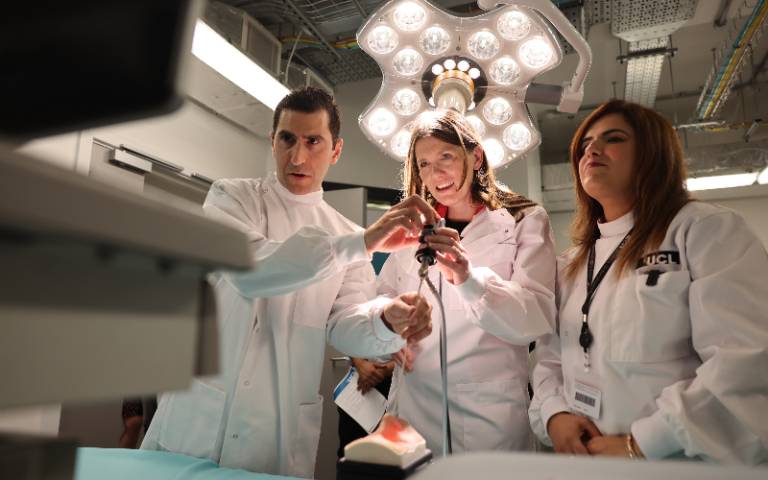UCL's world leading expertise in artificial intelligence was chosen as the setting, as UK Government announced £13 million will be invested to accelerate AI innovation in healthcare.

In the funding allocation, UCL has been awarded more than £2.2m for four AI driven research projects, that are all designed to find more efficient and effective solutions to current health challenges.
As part of the visit to talk with UCL scientists, Michelle Donelan, Secretary of State for Science, Innovation and Technology, was given a tour of the cutting-edge facilities at UCL's Wellcome / EPSRC Centre for Interventional and Surgical Sciences (WEISS).
On her arrival she was welcomed by Professor Alan Thompson, Dean of UCL Faculty of Brain Sciences, Professor Dan Stoyanov, Director of UCL WEISS, Dr Su-Lin Lee, Head of UCL WEISS Operations, and Dr Kedar Pandya (Executive Director for Cross Council Programmes, UKRI).
In a mock operating room, Dr Sophia Bano, Assistant Professor in Robotics and Artificial Intelligence at UCL, explained how her research is using AI to help advance endoscopy technology in pituitary surgery, assisting surgeons as they perform delicate keyhole surgery to remove small tumours from inside the skull.
The SoS was then given a hands-on demonstration of the technology by Consultant Surgeon, Mr Hani Marcus, Honorary Associate Professor (UCL Queen Square Institute of Neurology), who assisted the Minister as she guided the endoscope and surgery tool inside a 'phantom head', which is used for research and training.
Technology Secretary, Michelle Donelan, said: "AI will revolutionise the way we live, including our healthcare system. That's why we're backing the UK's fantastic innovators to save lives by boosting the frontline of our NHS and tackling the major health challenges of our time."
Dr Michael Spence, UCL President & Provost, said: "We are delighted to welcome Michelle Donelan, the Secretary of State for Science, Innovation and Technology, to UCL on the day UK Government announces a significant new investment in artificial intelligence and its application to health innovation.
"Applying artificial intelligence approaches and capabilities to healthcare has huge potential. UCL is a world leader in developing and utilising AI, bringing together scientists, engineers and clinicians, to work on game-changing research and innovation, that has the ability to truly improve people's lives.
"This funding will help UCL to accelerate four pioneering AI driven research projects, that aim to find new and effective solutions to some very challenging health problems, in the fields of brain surgery, cancer classification, electronic health recording and in applying machine learning to detect eye and other diseases with greater accuracy and efficiency."
UCL recipients of the Artificial Intelligence (AI) innovation to accelerate health innovation award:
- Dr Sophia Bano (UCL Computer Science & WEISS): AID-PitSurg: AI-enabled decision support in pituitary surgery
- Dr Charles-Antoine Collins-Fekete (UCL Medical Physics & Biomedical Engineering): AI-based diagnosis for improving classification of bone and soft tissue tumours across the UK.
- Dr Anoop Shah (UCL Institute of Health Informatics): Optimisation of natural language processing for real-time structured clinical data capture in electronic health records
- Professor Pearse Keane (UCL Institute of Ophthalmology): From 2 million to 20 million: scaling and validating a foundation model for ophthalmology, including the detection of eye and other diseases
The AI funding commitment was made as the UK continues its preparations to host the first international AI Safety Summit. UK Government announced that Matt Clifford, CEO of Entrepreneur First and Chair of the Advanced Research and Invention Agency, and Jonathan Black, Heywood Fellow at the Blavatnik School of Government at the University of Oxford, will lead the Summit preparations.
- Secretary of State for Science Michelle Donelan (centre) participates in a mock endoscopic pituitary surgery guided by Honorary Associate Professor Hani Marcus (UCL Queen Square Institute of Neurology)(left) and Dr Sophia Bano (UCL Computer Science)(right).
- Credit: Rebecca Wilson, Department for Science, Innovation and Technology






